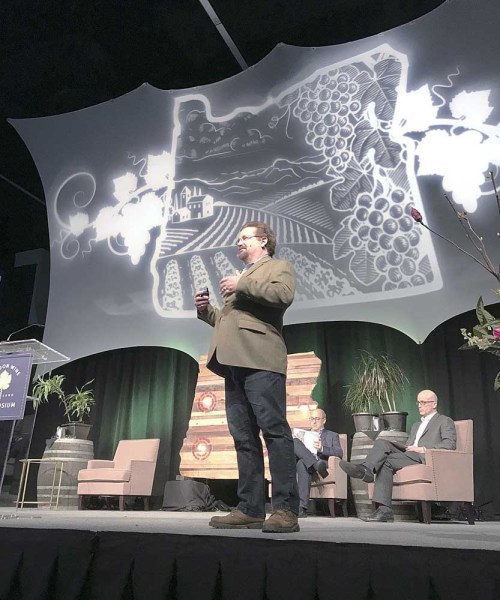Oregon wine sales boom but depend on aging consumers
Published 4:45 pm Tuesday, February 15, 2022

- Rob McMillan, executive vice president of the Silicon Valley Bank's Wine Division, speaks. Oregon wine sales have boomed in 2021 but the industry overall is too dependent on aging consumers, experts say.
Oregon wine producers are outpacing other wine regions in sales but face the same industry-wide problem of aging core consumers, experts say.
“It’s pretty stunning how far ahead of the pack Oregon was in 2021,” said Tom Danowski, president and CEO of the Oregon Wine Board.
With 24% sales growth last year, the state is “the best performing region out of all the majors” and continues to be the best positioned for more growth, said Rob McMillan, executive vice president and founder of Silicon Valley Bank.
“Oregon is rocking it. Oregon is the best thing going on in the wine industry, as far as I’m concerned,” McMillan said Feb. 15 during the virtual Oregon Wine Symposium.
The industry’s strong financial results don’t mean it can afford to rest on its laurels, especially with worrying trends developing, he said.
Wine consumption has flattened after a long period of growth while consumption of spirits has been growing and taking market share, McMillan said.
The wine industry overall is too reliant on older consumers and Oregon shares the same problem, he said.
For example, when asked what they’d bring to a party, roughly half of consumer older than 65 said “wine” in a survey, he said.
For other age groups, the percentage who answered “wine” was 30% or less, McMillan said. “If we’re not collecting mindshare for people under 65, that’s a serious threat we need to address.”
Higher wine prices at restaurants and reduced sales of economically priced wines at grocery stores don’t bode well, as they often serve as “on-ramps” for new consumers, he said.
The wine industry is an “incredibly good steward of the land” but that environmental consciousness often “doesn’t end up on the label,” which is a missed opportunity, McMillan said.
One potential to create new “on-ramps” is the rising popularity of smaller wine containers with a lower price point, he said.
“We can’t depend on 65-plus consumers but that’s what we’re doing and that’s a mistake,” McMillan said. “We’ve got to market to people younger than 65.”
On the positive side, the wine industry has found ways to capitalize on changing consumer behaviors during the coronavirus pandemic, said Lesley Berglund, a coach with the Wine Industry Sales Education company.
“For most wineries, our direct-to-consumer business is better than ever,” she said.
Corporate sales “boomed” during the pandemic as companies sought to provide clients with “virtual experiences,” she said.
Those purchases often had a “surprising ripple impact” later on, in the form of holiday gift buying and in-person tasting, she said.
“We couldn’t have imagined it two years ago,” Berglund said. “If we did it correctly, 80% of those drove more business.”
Wine club members have become more active during the pandemic, participating in more activities than just accepting “auto-shipments,” she said.
“They’re more engaged across different channels,” which has boosted sales, Berglund said.
Consumers generally have been buying more items online, which has helped direct sales, she said. Wineries should seize on that technological change.
“This is the time to invest and make sure we leave no stone unturned to ride the wave, to mix our metaphors,” Berglund said.
Due to concerns about disease transmission, wineries have offered more “private seated experiences” in tasting rooms, rather than having people belly-up to the bar, she said.
Done properly, such seated experiences translate to a higher “conversion” to wine sales and larger orders, she said.
Of course, the downside is that such a strategy can require more room capacity, staff and training, Berglund said. “We actually need more labor, not less.”
The robust sales seen by Oregon wineries led to a stellar year in mergers and acquisitions in 2021, with more on the way, experts said.
“Oregon has incredible value to price,” both in terms of wine quality and real estate, said Erik McLaughlin, CEO of METIS, a merger consulting firm.
Wine companies with “portfolios” of brands have been getting feedback that Oregon is an important regional category, he said.
“We’ve got to get us one of those,” McLaughlin said, explaining the thought process. “It has arrived as a category.”
By all indications, 2022 is likely to be another major year for mergers and acquisitions, he said.
“We’ve never seen a pipeline like this,” McLaughlin said. “We’re definitely in a high-activity cycle. The highest we’ve seen.”









